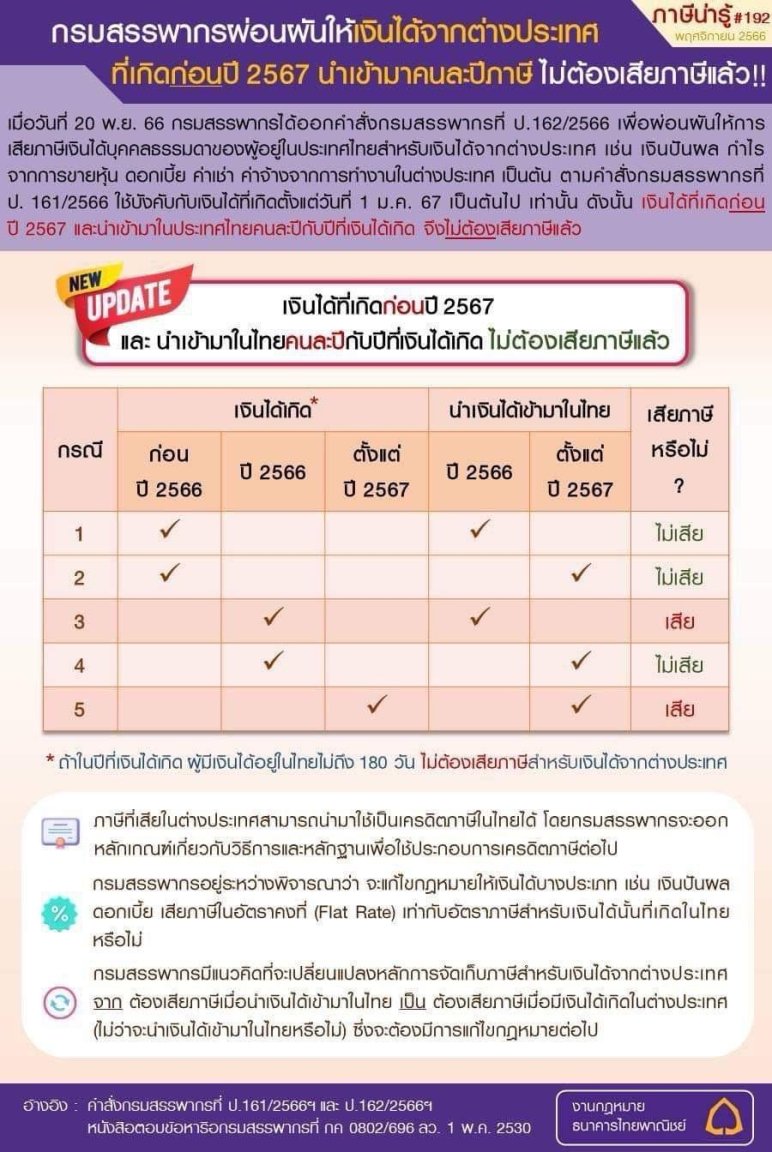-
Posts
6,842 -
Joined
-
Last visited
Content Type
Events
Forums
Downloads
Quizzes
Gallery
Blogs
Everything posted by Dogmatix
-

Decarboxylation machines - Reviews or Recommendations?
Dogmatix replied to connda's topic in Thailand Cannabis Forum
If you look on Alibaba you can find some inexpensive decarb machines with minimum quantity one piece and low cost shipping from China. I got one called the Herboven or something like that for about 30 bucks and it works well. Exactly the same model was available on Amazon and other farang websites for 2-3 times the price and very steep shipping. Of course they are exactly the same thing made in China. It came straight to the door with no tax because it was sent by mail and under 15,000 baht value. On Alibaba make sure you order the right model that 220v with the right plug for TH. -

Illegal Bangkok Bar Raided, 100-Plus Drug Users Found
Dogmatix replied to webfact's topic in Bangkok News
Of course this is the cops' job but the local cops won't take any action because the bribes from these big pubs are a big source of income to them. If they are brought in the loop, they will warn the pub and it will be closed that night. Anutin uses the excuse that the licenses are issued by district offices which are under DOPA at his interior ministry. In this case the pub didn't even have a license which is quite common because the licenses for a large entertainment venue are quite hard to get and need to meet some basic standards like fire exits. Many are designed in a way that they can never pass anyway. The owners find it easier to just pay a flat fee or even a share of profits to the local station commander, some of which gets shared out amongst his men. If any other cops were involved, you can be sure they were not local police or even Bkk Metropolitan police HQ which gets income up the pipe from the local cop shops but from one of the national police units with SWAT teams like Central Investigation Bureau or Crime Suppression Bureau which is part of the CIB that are not benefitting from the revenue flow from pubs. The interior ministry also has its own DOPA SWAT team which is now Anutin's private militia. Since he didn't have police to the pee pee tests, he brought in the Office of the Narcotics Control Board to handle the golden liquid. Having said all of that I would not surprised, if the pub was back in business after a year or two after greasing the right palms - perhaps when Anutin is gone from the interior ministry. -

Illegal Bangkok Bar Raided, 100-Plus Drug Users Found
Dogmatix replied to webfact's topic in Bangkok News
Yes, the real volume in wee hours drinking is from Thai yuppies, particularly this crowd doing drugs to stay up all night, not foreigners. The whales on the beach in Phuket don't go out till 4.00 am and most the sex tourists want to take their prey back to their hotel rooms long before that. -

Illegal Bangkok Bar Raided, 100-Plus Drug Users Found
Dogmatix replied to webfact's topic in Bangkok News
-

Illegal Bangkok Bar Raided, 100-Plus Drug Users Found
Dogmatix replied to webfact's topic in Bangkok News
Pub goers should be advised to carry a clean pee sample with them and pour it into Anutin's sample bottle when no one's looking. -

Illegal Bangkok Bar Raided, 100-Plus Drug Users Found
Dogmatix replied to webfact's topic in Bangkok News
I can't imagine that Anutin cares about this stuff very much but it is just a way for him to get in the news and show off his power to the police who are losing a lot of income when these pubs are closed down. He remembers the evil Purachai's social order campaign under the first Thaksin regime which also involved the minister taking pee samples from adolescent girls and made him so popular that Thaksin started to see him as a threat and extinguished his political career. Easy to do because Thaksin created him out of a nobody with no political faction and let him go back to being a nobody. -

Illegal Bangkok Bar Raided, 100-Plus Drug Users Found
Dogmatix replied to webfact's topic in Bangkok News
The girls from ONCB preparing the pee pee samples for Anutin's enjoyment. Apparently he read out the results of the pee pee competition from the stage. -

Illegal Bangkok Bar Raided, 100-Plus Drug Users Found
Dogmatix replied to webfact's topic in Bangkok News
Anutin is happy as interior minister as he has his own private militia, the DOPA SWAT team. SOPA is a catch all part of the interior ministry which manages district offices, which in turn manage licenses for entertainment businesses in their districts. It also handles gun licences PR and citizenship applications and many other unrelated stuff. Definitely needs its own SWAT team. It looks like there was a police SWAT team there too and a couple of senior cops, probably from CIB - anyone other than the Lardprao cop shop, or the place would have been shuttered when they arrived with no adolescent pee pee samples available for the minister's delectation. -

Illegal Bangkok Bar Raided, 100-Plus Drug Users Found
Dogmatix replied to webfact's topic in Bangkok News
Anutin asserted this raid operation was to respond to the Thai government’s economic stimulus policy that allows entertainment venues to provide services to 4:00 AM as of December 15th and to punish venues not currently following the law. How does raiding this pub or allowing bars to operate till 4.00 am stimulate the economy. Pub licensing hours in the UK were first introduced in WW1 to make workers more productive by being less drunken and hung over. The Thai government seems to have got this back to front like so many other things. -
I don't think it is correct to say you have to wait till a government department or Immigration (what has Immigration got to do with tax returns?) tells you to apply for a tax ID number. The Revenue Code requires anyone with assessable income over the minimum taxable amount after basic deductions to file a tax return. The minimal taxable income after deductions is, I believe 310,000 baht a year. Unless you are in employment, no one is going to tell you to apply for a tax ID number when your assessable income has surpassed this amount. How would they know anyway? It is up to you but, if you are audited by the Revenue Department, you are liable to interest and penalties in addition to any unpaid tax. The catch 22 for those receiving income from abroad that has already been taxed is that no one has any idea how tax treaties will be implemented. That means that it is impossible for many to know whether they have assessable income requiring a tax return and tax ID number or not.
-

Democrat party power struggle emerges ahead of leadership election
Dogmatix replied to webfact's topic in Thailand News
They are just fighting over the ashes of the party. -
You could argue that position because there is a RD ruling that held that employees of a Thai company but temporarily assigned to the Philippines could claim a tax credit for tax withheld in the Philippines. Otherwise there is nothing in the RC or rules or regulations that says that DTAs need to be taken into account in respect of personal income tax. On the other hand international treaties take precedence over statutory law which the director general of the RD doesn't have the authority to amend through P orders anyway.
-
I took a break from this thread for a few days to regain my sanity. Now as the year is drawing to a close I am thinking of liquidating some long held shares overseas. The question is does it seem likely that the RD would accept evidence of capital gains realised in 2023 as 'seasoned' income that can be remitted tax free any time in the future, regardless of what happened to the proceeds after that?
-
I am not if I missed something but my understanding is that the OECD's global minimum tax is 15% vs the Thai corporate income tax rate of 20%. So no big problem to Thailand, except for BOI privileges that often complete corporate income tax exemption for a few years for a new project. This has been under fire for a few years but seems unfair, as the tax exemption only applies short term to start up investments in Thailand and only the the products and services generated in the business. It can't be used for transfer pricing to avoid tax somewhere else. The BOI doesn't have anything else substantial to offer start ups. Since Thailand is too weak to stand up to this interference in its sovereignty from the rich OECD countries, I guess the day of the BOI being able to attract foreign investment are numbered, even though Thailand desperately needs it. Help with work permits and stuff and temporary land ownership is not enough to compensate for loss of tax privileges. Anyway this doesn't seem to have anything to do with the topic, except to show how Thailand fails to stand up to OECD.
-
When you say anything remitted before end Dec 2023 is not taxable I think that income earned in 2023 is taxable and possibly savings that you cannot show were generated as income prior to 2023. Remember that P 161/2566 comes into effect on 1 Jan 2024 and the old rule is still in force till then. P 162/2566 modified P 161/2566 which only comes into effect on 1 Jan. So income generated and remitted in 2023 is still under the 1985 RD ruling and therefore taxable. In future we might be dealing with income arising anywhere in the world being taxable regardless of remittance to Thailand, if the RD can get this government or a successor government to amend the RC in that way, as they apparently want to do. That might also necessitate a sort of amnesty for prior savings like P 162/2566. If all income generated before the start year is deemed non-assessable, then taxpayers could start with a clean slate and pay tax only on income arising from that date. It is OK for the RD to announce to the world what they feel the government and parliament should do. In fact it is the role of bureaucrats to make recommendations of this type on the understanding it is up to government and lawmakers whether they choose to follow the recommendations or not. But what is not OK in my book is when the bureaucrats use underhand methods to exceed their authority by effectively amending the law themselves in an unlawful manner, e.g. P 161/2566. But nothing to be done about it.
-
You can always file a case in the Central Tax Court, if you disagree with the RD and the amount at stake is worth paying lawyers for several years and you can have the tax plus penalties and interest available in case you lose the case. You might a precedent that would be helpful to others, if Thai courts didn't have a habit of ignoring precedents.
-
Some up dated advisories in the light of P 162/2566 from BM, EY and SCB for interest. The BM document is just in slide form. One slide gives the idea of using an offshore company to remit a "genuine loan" to the company's 100% owner who is tax resident in Thailand. It says this is not assessable but doesn't define "genuine loan". SCB reiterates the point from the Prachachart Thurakit article that a RD source said they want to amend the Revenue Code to tax all foreign source income in the year it arises, regardless of whether remitted to Thailand or not. I guess that is where we are headed eventually and a future MFP government with plans for enhanced welfare funded by an iniquitous wealth tax and other new taxes would probably make that more likely. Baker McKenzie 24 Nov 2023.pdf EY 28_Nov_2023[1].pdf
-

Bt5.1 billion to promote “soft power” activities next year
Dogmatix replied to snoop1130's topic in Thailand News
Soft power is meaningless and there is no accountability for the projects and consulting contracts to cronies that 5 bn of taxpayer dosh with generate. This is definitely a scam to rip off the taxpayer again and give PT PR machine a platform to get Ung Ing into obsequious Thai media while she waits for Srettha to plunge through the trap door. The 5 bn spend on nothing is inconsistent with Srettha's daily insistence that the economy is in deep crisis and needs to be bailed out with borrowings of 500 bn to pay for his vote buying pledge. -
The authorities will see to it that the loan sharks can no longer charge more than a 15% interest rate per year from any of their debtees, the prime minister said. 555. Most recent governments had an initiative like this but nothing palpable came of it. The large loan sharks all pay for protection or are family of police, military, local officials or politicians.. "Debtees". A ridiculous made up word. Never heard of debtors.
-
Singapore and HK, despite the small populations, have a lot of wealthy locals and because they have never had capital controls or any restrictions on investing overseas, you have a lot more investment income going back and forth for overseas investment, probably a lot more than from Thailand. It is locals' similar foreign source income that the RD wants to catch. Expats and foreign retirees are irrelevant to the equation in all three jurisdictions. Thailand is doomed if it is going to rely on higher tax rates and a broader tax net to improve the standard of living. HK and Singapore have done it by carefully maintaining competitiveness in all matters, including education and taxation to attract foreign investment through which most productivity gains flow, and hence GDP growth. Grow the pie faster and collect the same tax at lower tax rates. Thailand faces ever shrinking competitiveness, as seen in its shrinking share of FDI in SE Asian over the last quarter century. More heavily taxing a shrinking pie or a pie growing at a slower rate is probably not the answer but may be consistent with the type of short term fix thinking behind borrowing 3% of GDP to give away.
-
I have a practical question about the implications of the new order P 162/2566. I was planning to remit some funds before the end of the year but but these are old savings for which I have no records of tax being paid. The remitting account has also received some income during this year. So I was concerned the remittance could be interpreted as this year's income, if they adopt a LIFO approach. I assume that P 162/2566 may only be applicable from 1 Jan 2024 and that anything remitted before year end 2023 is taxable, if income deemed to have arisen in the same tax year under old interpretation. So, if it is remitted at beginning of Jan 2024, it is too early to be deemed as arising in 2024 and no income came into account yet in 2024. It is also covered by the P 162/2566 exemption for pre-2024 income. Am I missing something?











